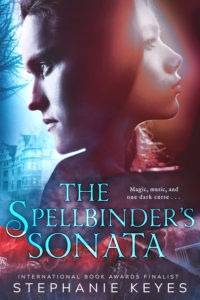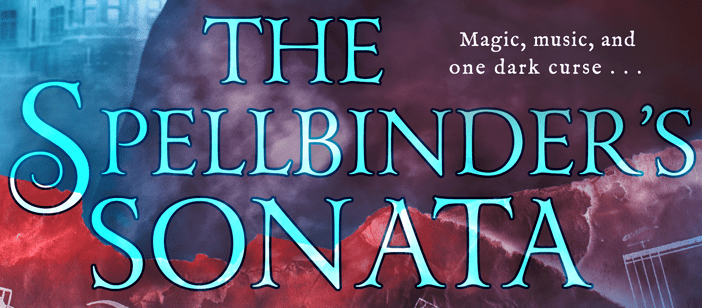From the publisher: “Beauty and the Beast meets The Phantom of the Opera in a tale of magic, music, and one dark curse…”
About the author: Local author Stephanie Keyes is the author of The Spellbinder’s Sonata and the YA Fantasy series, The Star Child. Her work also appears in the anthologies Moonbeams and Magic, Blood In The Shadows, and the international bestseller, Ever in the After: 13 Fantasy Tales.
When she’s not writing Young Adult novels, Keyes writes adult romance as Gemma McKay. Her debut novel in that genre, The Internship of Pippa Darling, was a finalist in the 2018 International Book Awards and 2018 Reader’s Favorite Awards. Stephanie has appeared at events through the US and the UK and was a featured artist at Highmark First Night 2019. For more about Keyes, visit her website or connect with her on Facebook, Twitter, and Instagram.
Fun fact: The Byrons School of Music mentioned in the below excerpt was inspired by the Byers-Lyons house, a North Side mansion on the former millionaire’s row of Pittsburgh where Keyes once studied the clarinet!
Wednesday, December 17th, 1902—
Pittsburg, Pennsylvania, US—Byrons Estate
 The cigar smoke formed a thick, unforgiving vice around my neck. It drew the air out of the room, leaving a haze hanging above head level. I detested everything about cigars. Their unpleasant aftertaste, their weight in my hand, the way the ash burned when it landed on my fingers.
The cigar smoke formed a thick, unforgiving vice around my neck. It drew the air out of the room, leaving a haze hanging above head level. I detested everything about cigars. Their unpleasant aftertaste, their weight in my hand, the way the ash burned when it landed on my fingers.
My hosts, the self-proclaimed Lord and Lady Byrons, had left a box of the finest Cubans (or so I’d been told) in my room as a welcome present. I did not feel welcome in the least.
The entire estate oozed moodiness, as though covered by a cloak of despair. It reminded me of my childhood residence in Warwickshire, England; more than a few spirits roamed that home. I’d had too many run-ins with impossible shadows and unexplained cold spots to assume otherwise.
 Clasping the red brocade curtain, I drew it back, surveying the road and other homes beyond the estate’s walls. They called the thoroughfare “Millionaire’s Row.” True to its name, only the richest of the rich resided at its edges. The row bustled with those hoping to be seen and those needing to be seen.
Clasping the red brocade curtain, I drew it back, surveying the road and other homes beyond the estate’s walls. They called the thoroughfare “Millionaire’s Row.” True to its name, only the richest of the rich resided at its edges. The row bustled with those hoping to be seen and those needing to be seen.
The garden, in comparison to the public street, had a stagnant look about it. I could almost envision it in the spring, partially alive with carefully controlled color.
“Griffin, come away from the window. There’s a good lad.” Jiggory Underhill, my manager and constant companion, walked into the room. “You’ll catch your death.”
It seemed Jiggory’s mission to control my welfare during my every waking moment. I permitted it only because it had been Jiggory who’d found me. Jig who’d rescued me from the tertiary country estate my father, a titled lord, had reserved for his only bastard son: me. It had been Jig who’d propelled me into the midst of celebrity.
He had helped make me successful. Years later, few hadn’t heard of the young piano virtuoso, Griffin Dunn. Jig was the closest thing I’d ever had to a friend.
“Are you nervous about tonight’s performance?” Jig rolled his cigar between his fingers.
I dropped the curtain, moving away from the December chill that stealthily snaked through the panes. “I am never nervous.” I straightened my collar and smoothed my jacket. “What sort of place is this anyway, this so-called Byrons estate? I’ve not even been assigned a valet.”
“It’s America, Griff. They do things differently here.” He shook his head, his smile turning smug. “Besides, you’re a child, not quite a man.”
I locked eyes with Jig. “They pay me as they’d pay a man.” How many chaps of sixteen could claim wages equaling mine? Five hundred and fifteen pounds per annum was practically unheard of in the circles we traveled.
Only last month, I’d performed to a packed house in London. That night’s pieces had included an orchestral arrangement of Beethoven’s Moonlight Sonata, featuring me as the star. I could still smell the tension that had built within the auditorium—a palpable thing that did not dissipate until the final chord resolution. I’d brought them to their feet.
“Drop the surly bit. You need a benefactor, and you’ll only get one if you invite ‘Charming Griff’ to the party,” Jig said. “Caring for your mother has taken what little earnings you’ve assembled. You won’t be able to pay my salary. I’ll be forced to leave.”
It was the same story he’d been touting for months, but I wasn’t living on my salary alone. My inheritance had allotted me an extra 5,000 a year. I didn’t need my income to survive.
“Pity.”
“You might think differently when you’re on your own. You’ve never had to do that before. What better place to achieve that than in the Americas? They’re throwing money at everything here.” Jig’s jaw set, his eyes glinting with the steeliness that made him a good manager.
“Byrons is an insufferable fool.” The evening would be torture. If I’d been at my home, Fulton House, I would have played a piece of my choosing, composed another work for my journal, or perhaps even spent the night with Clarissa. She did profess to love me, after all.
Jig shrugged, the tension from the previous moment trailing out of the room like long, smoky fingers. “No matter. You’ll win over someone else. Carnegie is supposed to attend your concert, and maybe one of the Vanderbilts. There are plenty of robber barons to choose from. Only you can determine your own success.”
My anger rose, a viper poised to strike. “I think not, Jiggory. You will find a way to ensure my success, or you’ll never manage another performer.”
Jig’s entire expression shifted, his eyes narrowing, his mouth reshaping into a hard line. “You overestimate your influence.”
“Do I?” The silence between us stretched, only to be broken by a knock on my door.
A voice rose from the other side. “Mr. Dunn?”
“Finally, a valet. It’s about time. Aren’t you going to get that?” I cocked an eyebrow. “You do still work for me, as I recall.”
Jig held my gaze for several beats longer, before sighing and moving to the door. With a twist of the knob, he revealed not the valet I’d been expecting, but a small boy, dressed in fine knickerbockers, a white shirt, and a jacket that rivaled my own in quality. The boy didn’t enter the room, but stayed at its fringes, resting his face against the doorframe.
“What is it, lad?” Jig asked, his voice more patient than I’d ever heard it.
The boy jumped but remained in the opening with his face pressed against the doorframe, as though something barred him from entry. He couldn’t have been more than ten years along. “Mr. Dunn, sir, I’m Jonah Byrons. I was hoping you could teach me to play, sir. See, I’ve always wanted to learn and I’ve heard you rehearsing. You are the very best.”
What a delightful child! Still, I had little experience with children. My own childhood was isolated, restricted to our few servants and Mother. Children were better left to their wet nurses and nannies.
Jig obviously didn’t feel the same. He got to his knee and gave the boy his best, most welcoming smile, catering to the child as though he were royalty. “Come in. Speak with us a moment.”
The boy quivered as though he might wet himself. In truth, I half expected him to run away. To his credit, he did not. He stepped over the threshold, finally allowing us to see his face. His green eyes widened as though he’d never seen an Englishman before.
Instant horror filled my person. I drew back, only realizing I’d crossed the room when I’d bumped into a chair.
The child was grotesque. One side of his face had been horribly disfigured, as though he’d been caught in a fire. I dimly recalled hearing about a gaslight fire on the estate the previous year. One of the boy’s eyes appeared half shut, while his cheekbone had been distorted into a series of fleshy ridges. What a horrid child!
“I—I—uh, what did you, er, say your name was?” Jig seemed surprised, but not horrified. How could he speak to it? Surely, forcing a smile for that mongrel stole all his energy.
Footsteps sounded in the hall. A moment later, a thin, blond woman of average height strode into the room. Her manner of dress was a plain, gray wool creation—the uniform of a Byrons servant. She placed a hand on the boy’s shoulder. “Jonah. Why aren’t you in bed? Come with me at once.” She spoke with a thick German accent, diverting her eyes to the floor.
“Wait, Nanny Minna.” The small boy broke free and rushed forward to tug on the hem of my jacket. “May I come to the performance tonight, Mr. Dunn? May I sit beside you?”
Pulling my jacket from his grasp, I focused on the boy’s slim fingers—anywhere but his face. “Absolutely not. The cream of society will be there. There will be no room for the likes of you.”
The boy’s face fell, but I could muster no sympathy. Far better he learned the true cruelty of life at a young age.
Nanny Minna drew herself up. “Jonah, do not let Mr. Dunn offend you. You’re better off not being in the company of one such as this.”
One such as this? How dare she! A servant calling me into question? “I beg your pardon, madam, but it is this child who is the monster.”
Narrowing her eyes, the nanny’s firm lips curled into a cunning smile. “Perhaps you do not see who the true beast is, Mr. Dunn. I, however, am not so blind as that.” She turned and exited the room with the same determined gait as when she’d entered, Jonah trailing in her wake, head hung to his chest.
Relief swamped me the moment they’d gone. “Thank goodness. Better she take the little monster away now than leave us to suffer him another moment.”
Jig shook his head. “Given your own birthright, I suppose I expected better behavior from you. Your mother would be most disappointed, had she lived.”
My throat thickened, pressing and halting the flow of my breath for a moment. A memory of her taking my hands in her own and spinning us around filled my head. Her spun-gold hair had flown behind her. We’d fallen to the ground giggling and laughing, her smile infectious. But the moment faded as quickly as it had appeared.
Mother was gone.
The clock in the hall chimed eleven. All thoughts of the boy faded away. It was time for my performance.
Jig flipped open his pocket watch. “We must go. After you.”
Tall windows let in the moon’s glow as I led the way down the polished hall. Alternating shafts of light formed a pattern across the floor. With only 8 days until Christmas, the requisite pine boughs adorned the banisters leading to the parlor, but otherwise, there seemed to be little to mark the season. Very different from how Mother once—
“Ladies and gentlemen, I give you the Griffin Dunn!” Jig had somehow moved ahead of me and had made my introductions. A sea of society awaited me. No time for childish reminiscences.
Forcing my grin to its widest possible reaches, I nodded to the patrons. Applause rang out. The crowd parted for me and a hush fell over the room. Moonlight from the tall windows bathed me in a glow as I took my seat at the piano.
“Mr. Dunn. Some water for you sir?” A servant stood to the side, a pitcher and an empty goblet in hand.
“Take it away, you fool. Don’t you see I’m about to begin a performance?” I muttered.
The servant nodded, drawing himself back into the shadows and taking the water away. Finally, the moment was perfect, and the spotlight was mine.
The stark white keys of the Byrons’ prize Steinway glinted beneath a row of gaslights. I laid my fingers upon the keys and it was as if I’d come home. No music sat on the stand before me. The notes simply appeared in my brain as though they’d been burned there—mine to remember for all time.
The Byrons had chosen the program for that evening, but it was my performance. Instead, I launched into an impromptu selection on my part—one of my own compositions—Redemption.
Tipping my head back, I let the music take me over. The complex chord changes pulled me in. The notes reverberated throughout the parlor. They’d never heard anything like my music before. It broke all the rules of theory, with chord changes a beat away from tripping over one another in their ferocity to resolve themselves. I could almost smell the applause as I struck my final chord.
Yet, my standing ovation never came. The sound of shattering glass obliterated the moment. A swift, hard thud followed, sending tiny vibrations across the floor, replacing any accolades I’d hoped to receive. Instead of cheers, there were screams—shouts that grated my nerves and rang in my eardrums.
I pivoted on the piano bench and wished I hadn’t. In the middle of the parlor floor, on a blanket of shattered glass, lay the deformed little boy I’d met a short time ago. The one who’d begged me to teach him.
He should have seemed even more monstrous then, with a trail of blood seeping from between his lips. Instead, there was only innocence in his pale, sleeping face, hideous even in death.
“Jonah.” Lord Byrons fell to his knees. He stretched a meaty hand forward, brushing his fingers along the boy’s cheek. Mrs. Byrons stood apart from him, one fine, shaped eyebrow frozen aloft.
A banshee-like howl shattered the moment’s hold as Nanny Minna rushed into the room. An audible gasp broke the silence as she pushed Lord Byrons away to reach the boy. She collected Jonah in her arms, clutching him against her. A sob ripped from her throat. Each of us bore witness—a helpless audience to the tidal wave of the woman’s personal despair.
After a time, Nanny Minna lowered Jonah slowly to the ground and rose to her feet. Gone were her light, critical eyes. Soulless, black pits had sunken themselves into her pale face.
She thrust a finger in my direction. “Murderer!”
Her accusation slammed into me, along with the realization of what Jonah had done. He must’ve crawled onto one of the interior skylights in an effort to see my performance. But still, that did not earn me the title of murderer.
“Madam, I did nothing.” It was true. I’d been performing. I hadn’t forced the child to watch my concert from above.
Minna shook her head, her jaw rigid, her eyes surely as cold as the ice crystallizing within her heart. “You would not help him when he asked. Your own selfishness cost this child his life, and you’ve taken my heart from me. You will pay for what you have wrought.”
Raising her hands into the air, she closed her eyes as she said: “May he be bound to this house until true love finds him . . .”
But any hope I had of understanding her was lost as she switched to German, chanting a string of dark-sounding, guttural words in a language I didn’t understand. Before my eyes, the shards of glass from the broken skylight rose above the ground to hover in mid-air. Nanny Minna waved a hand and the pieces began to spin, faster and faster, moving closer and closer, until they’d formed a tight funnel.
Before I could take cover, she pointed at me and the shards of broken glass, still covered in Jonah’s blood, pummeled my chest and drove the very life from my body.
Excerpted from The Spellbinder’s Sonata by Stephanie Keyes, copyright © 2018. All rights reserved. No part of this excerpt may be reproduced or reprinted without permission in writing from the publisher.

























